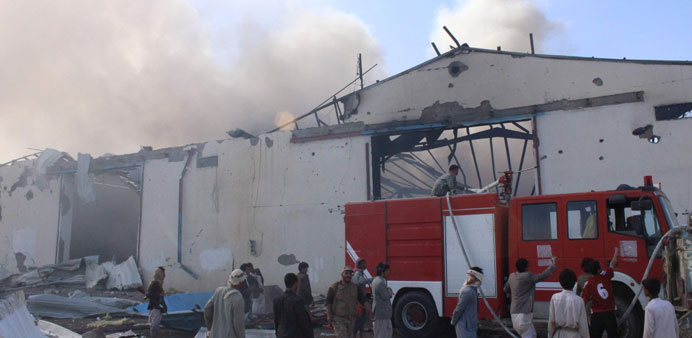AFP/Sanaa
Saudi Arabia, which is leading a bombing campaign against Shia rebels in Yemen, pledged yesterday to cover the entire $274mn in humanitarian aid sought by the UN for conflict-torn Yemen.
The United Nations says hundreds of people have died and thousands of families fled their homes since the air war was launched on March 26.
Fighting and air strikes over the past two days have left 130 people dead in Yemen, according to medics, military and tribal sources.
Overnight Friday 52 people were killed, including at least 27 people who died in the southwestern city of Taez during clashes between loyalist forces and the Iran-backed Shia Houthi rebels and air strikes.
Saudi King Salman ordered the humanitarian pledge following a UN appeal on Friday for $274mn in emergency assistance for the millions affected by Yemen’s war.
The kingdom “stands with its Yemeni brothers” and hopes for “the restoration of security and stability”, the state Saudi Press Agency said, quoting an official statement.
UN Humanitarian Co-ordinator Johannes Van Der Klaauw said in Friday’s appeal: “Ordinary families are struggling to access healthcare, water, food and fuel—basic requirements for their survival.”
Aid has only trickled into Yemen, largely because of restrictions imposed by the coalition on its airspace and ports.
The rebels swept into Sanaa last September from their highland stronghold and then advanced south on the port of Aden, forcing President Abd-Rabbu Mansour Hadi to flee to Riyadh.
Residents said explosions and gunfire shook Taez overnight during fighting between Hadi loyalists and the insurgents.
Nineteen rebels, four soldiers from a mechanised army unit loyal to the president and four other pro-Hadi fighters were killed, a medical source said.
Rival fighters also clashed on Friday night in districts of Aden, the main southern city, residents and security sources said.
Pro-Hadi forces backed by air strikes held off rebels battling for the past week for control of Aden’s refinery, 15km west of the city.
The bombing campaign was launched amid Saudi fears the Houthis would shift Yemen into the orbit of Iran.
Tehran is a key ally of the Houthis but denies arming the rebels who have allied with army units loyal to Ali Abdullah Saleh, the Yemeni president forced out by the 2011 uprising.
Yesterday, Iranian President Hassan Rouhani said his military should not be seen as a threat in the Middle East.
The presence of Iranian naval ships in the Gulf and the Gulf of Aden “is intended to ensure the security of neighbouring countries and maritime traffic”, Rouhani said at an Army Day ceremony.
On Friday, Tehran submitted a four-point Yemen peace plan to UN chief Ban Ki-moon.
It calls for a ceasefire and immediate end to all foreign military attacks, the urgent delivery of humanitarian and medical aid, resumption of political talks and the formation of a national unity government.
Al Qaeda has taken advantage of the air war on the Houthis to expand its influence in Yemen.
On Friday the militant group overran an army camp in the southern province of Hadramout, a day after seizing the airport in provincial capital Mukalla.
Tribesmen, a key component of the impoverished country, also seized a major oil terminal in Hadramout on Thursday.

Civil defence workers try to put out a fire caused by an air strike in Yemen’s northwestern city of Saada yesterday.
